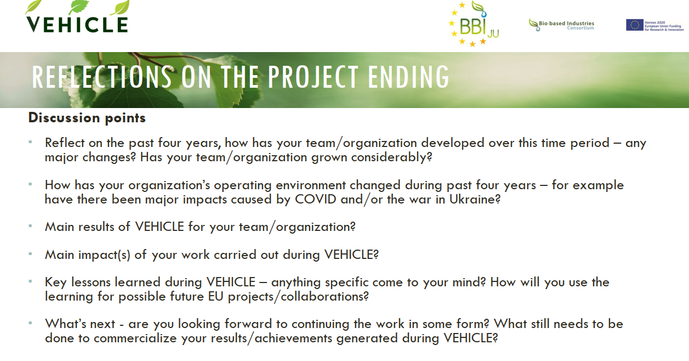Photo by Brands&People on Unsplash
VEHICLE project ended on April 30th, 2023 (M48) - the successful collaboration throughout the project inspired the partners to reflect on the past four years spent together to successfully reach the objectives of VEHICLE.
With the VEHICLE project coming to its end, the project partners were asked to reflect on the project in general over its 4-year duration, and the successful work carried out together through challenging times in Europe and globally.
To review the impacts and outcomes of the project click this link.
The VEHICLE partners were asked to reflect on the project ending with a set of questions higlighted below:
In general during the four year duration of VEHICLE some of the partner organizations have grown in size quite considerably, while others have remained pretty much the same size over the course of the project. For example VEHICLE coordinator Avantium, Fibenol, BETA and Spinverse have all grown considerably in size during the last four years. For other partners the growth of their organizations has been more moderate during VEHICLE.
For many of the VEHICLE partners the last three years since the outbreak of COVID-19 globally in early 2020 have been especially challening with the introduction of remote work and other major changes to everyday life caused by the COVID-19 pandemic. In early 2022 Europe was also gravely affected by the war in Ukraine, which brought about major challenges to energy supplies in the EU as well as additional stresses to global supply chains, already affected negatively by the COVID-19 pandemic earlier on. In general the VEHICLE partners agreed that remote work was a big change in their operating environments and guaranteeing the safety of personnel as well as effective communication both took fundamentally important, and permanent, roles in everyone's organizations during the past few years.
The VEHICLE partners had very different roles in the project - some smaller and some larger. In general the objectives of the project were successfully achieved during the four project years, helped in large by the smooth and efficient collaboration between all the VEHICLE partners.
As a summary the partners mentioned one of the key result higlights of the project were the established and very well maintained relationships between the partners, helping to take the work forward after VEHICLE, towards the development and future commercialization of even more sustainable processes and end products. The impacts of the project are understandably very strongly linked to the achieved results and project outcomes.
Project as complex as VEHICLE has understandably many key lessons learned for its participants. VEHICLE coordinator Avantium summarised their key lessons learned as the following: "During the course of the Ray Technology, we realized that there is a regulatory vacuum for biobased drop-in products. In particular, in some cases it is a challenge to apply validated methods (e.g. ASTM) developed for fossil fuel-based processes to new/green technologies. This also applies to requests forwarded to external, certified analytical laboratories. Both can be obstacles to the development of new technologies".
Another partner higlighted the importance of securing certifications and internationally recognised approval processes for taking laboratory scale development work further to industrial scale testing and trialing. Also the fact that simply being bio-based is not always sufficient for all industries - a bio-based alternative to fossil-based feedstock also has to offer great economic and performance advantages as well to be truly competitive on the market. In addition it has been recognised that some industries and geographies might be more conservative to others, potentially hindering the acceptance of bio-based solutions.
One partner also offered great advice on how to improve the work even further for future projects: "We could have had more meetings 1-on-1 to improve the overall understanding between partners even more. This in turn could have potentially led to even better results. By having more bilateral discussions between the partners the chance of succes might have been even higher. Also, perhaps even more focus could have been made for Work Package (WP) specific meetings". Both are key learnings to enable even more efficient work in future multiparty EU projects.
Novamont summarised their key lessons learned as following: "The studies carried out within the VEHICLE project have laid the foundations for the development of integrated biorefineries relying on the use of sustainably sourced 2nd generation feedstock in mix with 1st generation feedstocks. The innovation potential and further exploitation in future EU projects/collaboration of this result is extremely high, since the experience acquired in VEHICLE can be transferred to other 2nd generation feedstocks and side-streams deriving also from other sectors (e.g. wastewater treatment, organic waste, lignocellulosic residues from agricultural value chains). It will be necessary to implement large-scale models to increase technical and economic competitiveness.".
Another key lesson pointed out by a VEHICLE partner was to be flexible and have a wide-reaching approach to the work in general: "good approach is to test out different strategies and different feedstocks for different applications for the best outcome".
With many large industrial players as partners in the project confidentiality was also a key factor during the project as one partner pointed out as their key learning: "biggest learning was linked to the large issue of confidentiality, and the challenges related to the proper handling of the confidentiality. As you are creating new value chains with actors that influence each other, handling confidentiality properly was a top priority. During VEHICLE this was handled very well as all partners felt safe and secure, and the data was treated respectfully and ethically".
The future outlook of the partners was the final discussion point - what's the plan to take the work of VEHICLE forward after the project has now officially come to a close? For VEHICLE coordinator Avantium the future outlook is the following: "Avantium has tested the VEHICLE (hemi)cellulosic sugars for the production of bio-based glycols. These second-generation sugars are very important for the production of biobased materials in a cost-competitive and non-limited way. Avantium has developed the one-step Ray Technology™ process for producing drop-in plantMEG™ and plantMPG™ from renewable resources. Ray plantMEG™ and plantMPG™ can compete with existing petrochemical MEG and MPG in both cost and quality. The plant-based glycols were successfully validated in relevant applications such as polyethylene terephthalate (PET), polyethylene furanoate (PEF), deicing and heat transfer fluid formulations. The Life Cycle Assessment (LCA) on the Ray plantMEG™ and plantMPG™ was developed for the preparation of scale-up to industrial size plants. More info can be found on Avantium website. The next phase after this project is to deploy a Ray commercial flagship plant with a strategic partner. Target customers of this flagship plant will primarily be polyethylene terephthalate (PET) producers as well as MPG and glycerin utilizers".
For Novamont the future outlook was summarised as following: "Novamont will continue the work on process optimisation and new products development in the coming years, also evaluating the possibility to further exploit the fruitful synergies developed with some of the project partners during the implementation of the project".
Also other VEHICLE partners higlighted the great synergies and important relationships built within the Consortium during VEHICLE as key enablers of impactful future work - the look for new innovative EU projects continues after VEHICLE to generate even more positive impact for the European bioindustry sector.
In additon the importance of proving the functionality of bio-based solutions in full industrial scale is a key future step for many partners - the work carried out in laboratory and pilot scale needs to be successfully scaled-up to full industrial scale.
Transfering the collaborations carried out during VEHICLE to truly commercial scale operations at different production units throughout Europe will be a top priority for many VEHICLE partners in the coming years.


